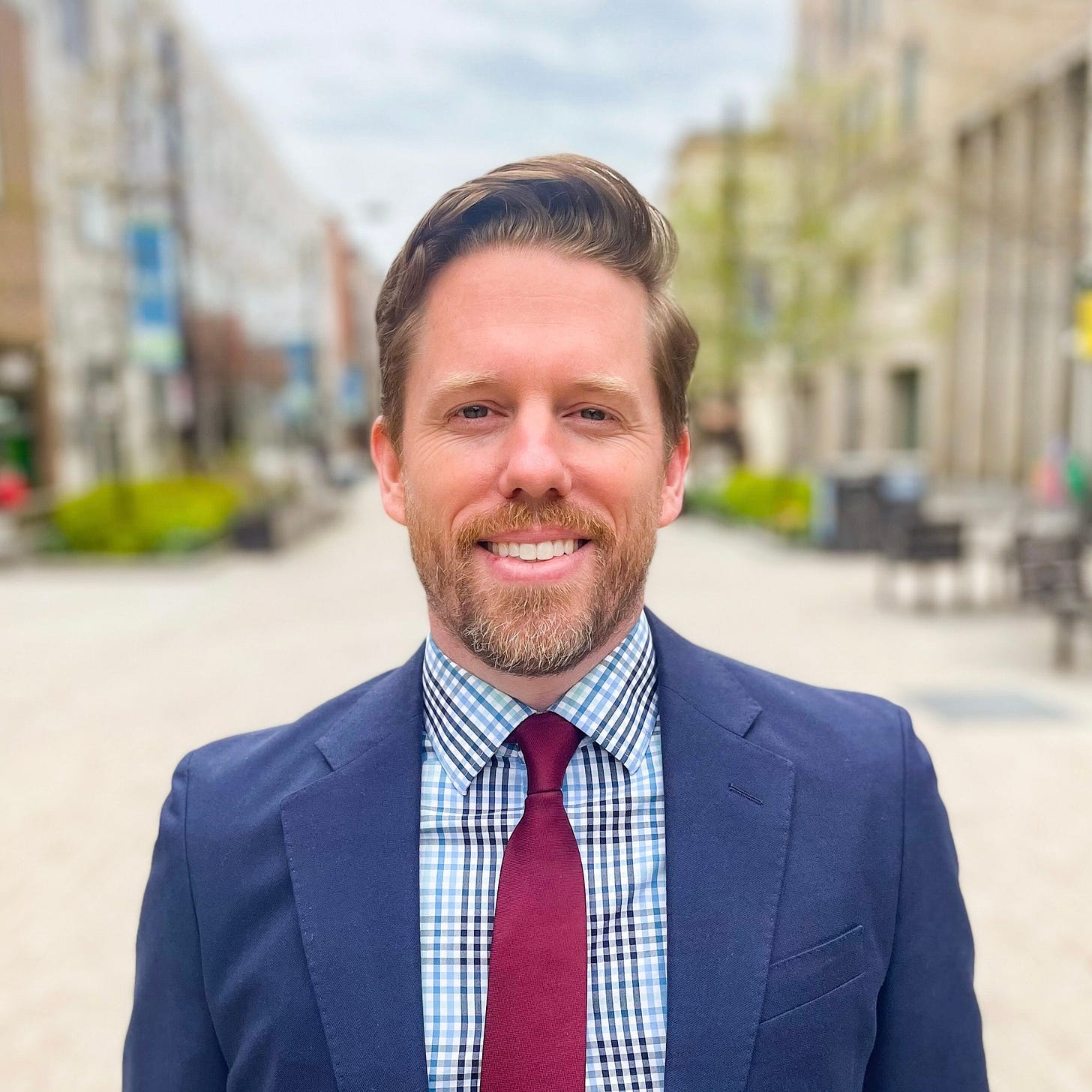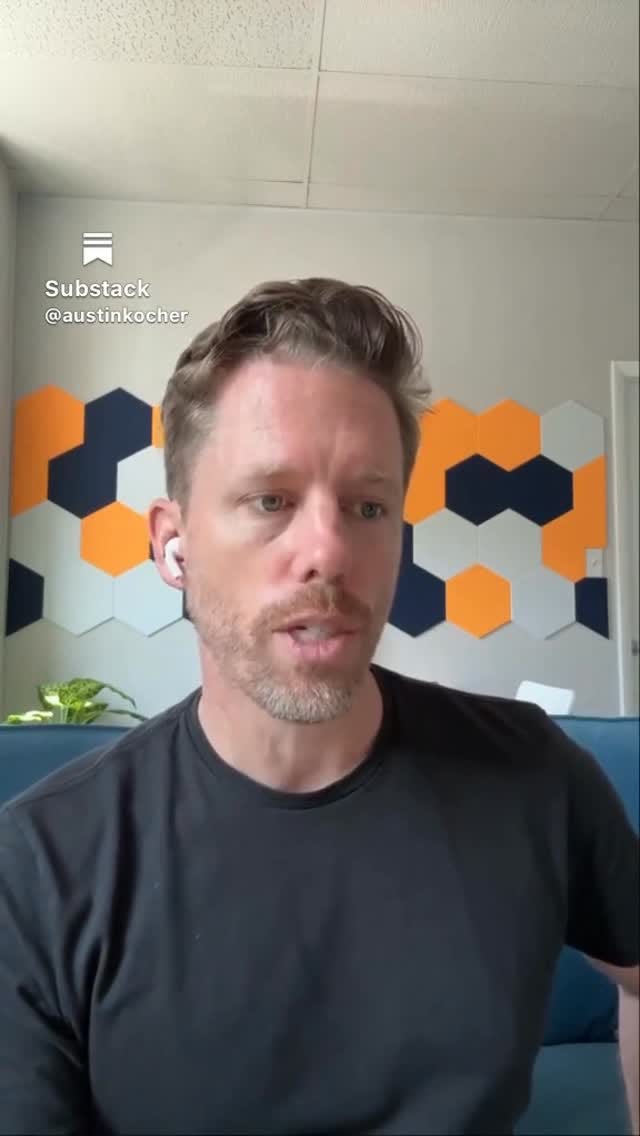“At the core of immigration enforcement is a question: who belongs where?”
Austin Kocher shares how he unpacks systems of immigration for the general public.
Even before Trump returned to office, Dr. Austin Kocher has been helping explain and dive deeper into the immigration policies and enforcement efforts shaping the United States. As an Assistant Research Professor at Syracuse University and through his widely read Substack, Dr. Kocher’s offered level-headed explanations of how this country’s immigration apparatus operates.
In this first half of our conversation, Dr. Kocher talks about how his work as a geographer shapes his understanding of current immigration contexts.
ANTERO GARCIA: In broad terms, can you describe the work you do?
AUSTIN KOCHER: I'm a geographer, first and foremost, and I study the immigration enforcement system, everything from the first time that an individual comes into contact with law enforcement or immigration enforcement of some kind all the way through the end of that process.
A lot of that work over the last 15 years has been very qualitative. I've interviewed a lot of law enforcement. I tend to study systems that affect people, as opposed to the people themselves. That's partly because I think that's work I'm better qualified for.
It's also part of a theoretical and a methodological framework as a political geographer specifically that we tend to be more interested in studying and critiquing systems of power and marginalization, rather than studying the people who are themselves marginalized. There's a whole ethics around where we should put our research gaze.
So, I'm really focused on understanding and critiquing the state. And that means that commitment did not begin as a commitment to doing quantitative work or to looking at data. But I stumbled into it because, actually, it turns out that understanding the data that's held in government databases, not only provides a really unique and very granular insight into how these systems work and who is affected, but actually understanding the systems themselves helps us to think critically about the kinds of knowledge that the state is producing about immigrants.
“Understanding the systems themselves helps us to think critically about the kinds of knowledge that the state is producing about immigrants.”
AG: People often think of geography as this archaic topic – paper maps and way-finding. Can you describe how digital systems are defining or shaping immigration right now?
AK: Geography is one of these old school social sciences. Very few people get a job as a geographer, strictly speaking. It's much more a theoretical framework and methods training that you sort of combine with themes or particular topics, and mine just happens to be immigration.
So, from that perspective, geography has this very critical, in some ways, very radical intellectual history, even among the social sciences. Questioning systems of power is just core to a lot of what we do. Historically, if we think about political geography 2000 years ago, it's asking the literal question of who has the high ground? Who has more troops? Who knows the landscape and the culture, classical, territorial battles over land? We're seeing that unfold in Eastern Europe with the war between Ukraine and Russia. We're seeing in a really terrifying way, a similar thing happening in the Hamas-Israel war that's been going on now.
But these similar kinds of things are unfolding in virtual spaces. It shapes how we think about space. It shapes who belongs to certain spaces. So even immigration policy, the reason that immigration policy is so interesting to political geographers is at the base, at the core of the immigration enforcement is a question of who belongs where.
That's all immigration is: who belongs where? And that's a fundamentally geographic question. And the way that this question is getting answered is increasingly not just about physical places and spaces, but also about virtual spaces. In many ways, the enforcement apparatus is encroaching deeper and deeper into people's everyday digital spaces. So as a US citizen, when I'm coming back across the border, I need to be mindful about what's on my smartphone because the kinds of protections that we imagine that we have in other places don't apply in the same way.
Similarly, there's new policy that effectively requires any immigrants applying for benefits of any kind, they have to turn over all of their social media and online handles to the US government. We understand digital spaces as a mix of public and private, they are being investigated in these processes. I try to use these examples because people tend to go to think of surveillance as things like drones. That is also there, but surveillance happens in really subtle ways as well.
AG: That makes sense. I am also thinking about how things like the use of the Alien Invasion Act is pulling immigration processes back in an older direction, too. Archaic forms of xenophobia and control—the “high ground” example—are being enacted today too.
AK: Absolutely. A lot of us in the political geography world have spent the last maybe 50 years of the discipline trying to understand all of the very nuanced way that society is controlled through spatial mechanisms of access and exclusion and all of these really subtle things. Even if you've been in a major city in the last 10 years, you've seen these park benches that are effectively anti-homeless designs that won't allow people to lay down, and that's a way of controlling access to space. It's kind of subtle in some ways, but it's remarkable the ways in which the Trump administration has, as you said, essentially just gone old school. They're not even trying to hide it. It's like revolutionary France. Literally, Trump tweeted a quote from Napoleon III about “He who saves his Country doest not violate any Law.” So yes, we've retrogressed in that way.
“It's remarkable the ways in which the Trump administration has essentially just gone old school. They're not even trying to hide it. It's like revolutionary France.”
AG: So maybe a very obvious question, but of all the things you could study, why immigration?
AK: I got into this in 2008 or 2009. At that time, there was this immigration policy, which is now being remobilized called 287(g). 287(g), as I'm sure you know, was a really unique policy in the late second Bush administration that allowed local law enforcement to do immigration enforcement. And that came out at a time when I was sort of coming of age and getting more involved in community issues and saw this as a problem. Something that most people probably don't know is that I was in the Navy right after high school. I spent four years in the Navy and I was doing law enforcement work in the Navy. I was a law enforcement officer of all things.
AK: In Puerto Rico.
AG: Whoa.
AK: Yeah, during 9/11. And I came out of that experience because of the invasion of Afghanistan and Iraq, because of the post 9/11 landscape. I was very young. I didn't know what I was doing. For me, it was a real awakening. And actually there's a lot of veterans from that period who living through that period kind of really went the other way and really questioned the US foreign policy. I was interested in how I could use my experience in the military and as a law enforcement officer, how do I use that experience for good in some way? When 287(g) came out and I had an opportunity to go to graduate school and do research, I thought, "Oh, this is great, because who's going to have better access to interviewing law enforcement officers than a guy that looks like me with a short haircut and is a veteran and was a cop." I was able to leverage that experience to interview a lot of people, and I had enough background knowledge to already kind of understood the basics of policing so I could sort of get into questions and I think people trusted me to talk about that. It sort of just took off from there. I love the research. I love being a part of a community. I mean it’s also volatile, it's heartbreaking every single day, and yet it's urgent, it's important.
Some people drive towards happiness and some people drive towards purpose. And sometimes being happy isn't always purposeful and sometimes being purposeful isn't happy all the time. I'm a purposeful person.
AG: Did you expect your research and your Substack to get the kind of visibility it's getting now?
AK: I definitely didn't expect where it's gone. That is a huge surprise. I started it partly because I'm a little bit of a technophile. If there's something new out there, I like to understand it. I never want to be so far behind the way that technology is going and I don't ever want to be too far behind on where digital culture is going. So when it started out, it felt good to have something between social media and peer review academic journals that could be a little bit more thoughtful.
AG: Yeah, you don’t have to wait two years for your work to come out.
AK: You don't have to wait. It's the timeline, you know that. If you want to say something, how do you say it? I mean, you used to be able to tweet it or to make a Twitter thread, and that was incredible, that was really my first experience with having research take off was Twitter. But then once Musk bought Twitter, I said, "Oh, I want to have something that I own or that I control. I don't trust these platforms anymore. It could all go away tomorrow, and you just lose all of it." So that's when I sort of leaned into it.
Propina
We’ll share the second half of our conversation with Austin Kocher next week, where we look at some of the surprising aspects of how immigration enforcement has taken shape in the U.S. under Trump’s second term. In the meantime, consider subscribing to Austin’s Substack, if you haven’t already.
Next Thursday, Alix and Antero will be in conversation with Julissa Arce at Chevalier’s Books in Los Angeles. If you are local, please RSVP and join us (books ordered in advance are discounted). If you are not local, RSVP and you’ll receive a link to join us virtually.
We’ll see you next week.









Great interview. Thank you.